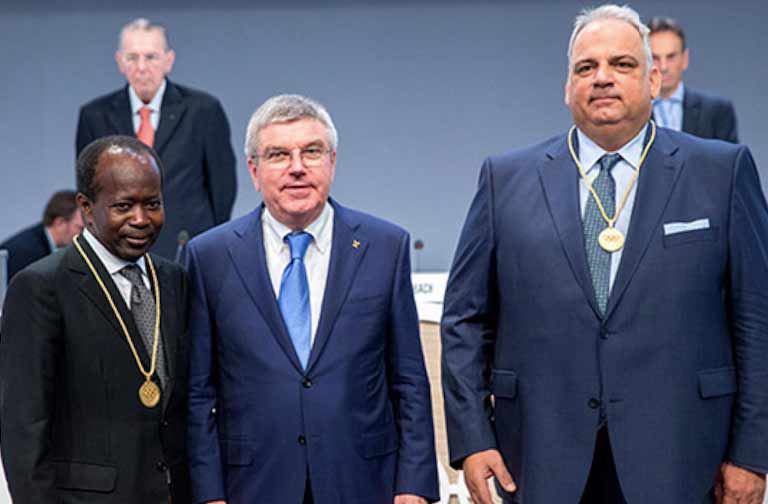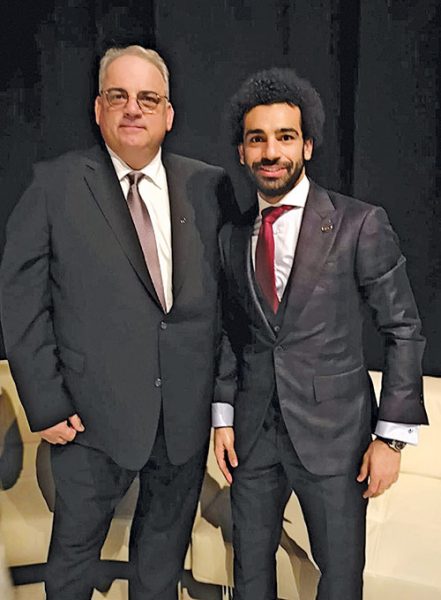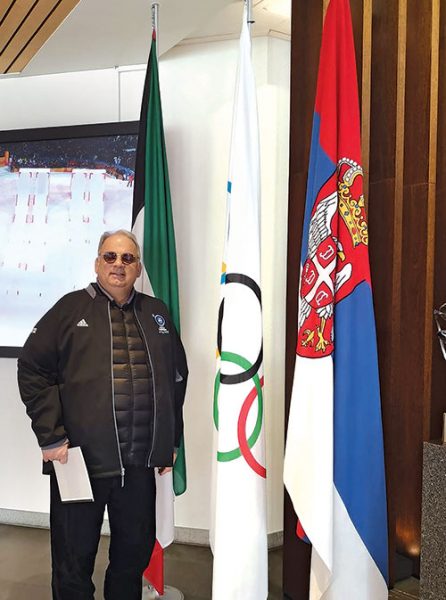This member of the Executive Board of the International Olympic Committee (IOC), a man who holds around a dozen important positions in world sports, discusses the challenges he faced in 2020, including retesting at the World Anti-Doping Agency (WADA) to reveal those who cheated 12 years ago, while he reveals that a vaccine will not be mandatory for the Tokyo Olympics
Serbia isn’t a country that has great influence around the world, but one Serb is among the most influential people in world sport. He is Nenad Lalović (62), a member of the Executive Board of the International Olympic Committee (IOC) who also holds around a dozen other important positions in sports. To begin with, let’s just mention that he’s also the president of the United World Wrestling (UWW) governing body and a member of the management boards of the World Anti-Doping Agency (WADA), the Association of Summer Olympic International Federations (ASOIF) and the Global Association of International Sports Federations (GAISF).
“I have three functions at the World Anti- Doping Agency alone. It’s not easy to harmonise everything, but I consider it as recognition. I have the most obligations in wrestling, as the top man of the world governing body,” says Lalović, a native Belgrader who has been based in Switzerland in recent years, although he more often finds himself aboard planes, except during this time of the Coronavirus Pandemic.
We would presume that it isn’t difficult to single out the event that marked 2020 for you – given the postponement of the Olympic Games in Tokyo?
If we set aside the pandemic, which changed the face of the entire planet, the postponement of the Olympics was something that I would single out. The decision to postpone the games was difficult, but also optimistic. Some accuse us of hesitating with the postponement, which isn’t true. We didn’t hesitate, but rather made an overview of all the consequences of every possible solution. It is much easier to cancel the Games than to shift them by a year. Cancellation would be pure surrender. IOC President Thomas Bach sought a solution and negotiated directly with the Prime Minister of Japan and the Mayor of Tokyo, together with the Organising Committee. And together they reached a solution. It was normal that, as a member of the IOC Executive Board, I was present at the source of all events; I knew what was happening at all times and believed that we would find the right solution.

We are satisfied that the Games will be held, although we are aware that this causes plenty of complications for international federations, and for the organiser the most. It wasn’t easy for us at the IOC either. It was necessary to carry out an overview of all the ramifications: some federations have a problem with financing if the Games aren’t held, then there are relations with the owners of TV rights, disruptions to the qualification system etc. Just over 50 per cent of competitors have so far qualified for Tokyo. We are all convinced that the remaining qualifications will be held in a fair and sporting way. Any kind of administrative qualification is out of the question, because that is not in the spirit of sport and the Olympics.
It’s no secret that many sports live from the distribution of money earned from selling TV broadcast rights for the Olympic Games, so this ensures that the pandemic created a difficult situation for many?
On the basis of analysis, the IOC redirected part of funds to international sports federations, to those who needed it the most. That is actually an advanced payment of the income that these federations will earn on the basis of TV rights. We also helped the Organising Committee of the Olympic Games to a certain extent. We see in the media today that the cost of the Games has risen by 2.8 billion dollars as a result of all that. Of course, the greatest challenge confronted Japan, which reorganised itself phenomenally despite all the difficulties.
Have the new circumstances led to any changes in the way the Olympic Games are insured?
The insurance is valid only for Games that ultimately aren’t held. Insurance cannot intervene in this case, because the Games will take place. The situation is the same with international federations. The IOC’s goal wasn’t at all for insurance to be paid because there are no Games, rather we directed all of our efforts towards creating conditions that would enable athletes to fulfil their dreams and compete in the planet’s biggest sporting competition.
You head the governing body of world wrestling, and it is known that martial arts have been hit hardest by the pandemic, due to the nature of the sport requiring direct physical contact between competitors?
This is a particularly harsh blow for all indoor sports. We didn’t have any major competitions in wrestling after 15th March. We finished the last competition in Ottawa, where we had qualifications and the championship of North and South America. Competition had already started when the pandemic was announced, and then – with the special permission of the authorities of the City of Ottawa – we continued and completed the competition. We didn’t have any infected participants, but we did have a lot of problems.

Many teams were unable to return home because planes were grounded. Some spent a month travelling home. Some athletes were accommodated in their embassies, while we helped some of them by renting apartments and transporting them home in various ways. This was a great odyssey for some… It seems to me today that everyone is aware of the infection and the pandemic, to cope with it. Life goes on.
Solutions must be found for ways to continue normally, alongside all sanitary measures that prevent the spreading of the virus. That’s more difficult in the halls, but we are witnessing that basketball, handball, and other team sports that have more contact at some points than wrestling, are being played. We are already used to some players not playing because they have tested positive, that matches are postponed but still played. We postponed competitions for two months at a time, because we didn’t want to quash the hopes of athletes that they would compete in the foreseeable future. And that lasted until October, when we started with tournaments in Moscow, Warsaw and Zagreb.
THE MAN WHO BROUGHT KUWAIT BACK INTO THE OLYMPIC FAMILY
Three years ago, California-based professor of journalism Alan Abrahamson, one of the best experts on the opportunities of the Olympic movement, ranked Nenad Lalović among the most serious candidates to replace Thomas Bach as head of the IOC when he leaves that position. Lalović has imposed himself on various fields in sport. He became the first person from Serbia (Yugoslavia) to be elected to join the IOC Executive Board, and prior to that he became a member of the IOC (similar to the assembly that included fellow Serb and former FIBA Secretary General Bora Stankovic from 1988 to 2005). Alongside all the functions noted at the start of this interview, Lalović is also a member of the Olympic Solidarity Commission, which is one of the IOC’s key commissions, tasked with helping to finance athletes and national Olympic committees. He is also a member of the IOC Olympic Summit (which is held annually), head of the Oversight Commission of the AIBA (World Boxing Association) and member of the Crisis Group for Changing the Qualification System in Sports for the Tokyo Games, while he was also head of the Crisis Group to return Kuwait to the Olympic family (Kuwait is again an IOC member state), a member of the Management Committee of the Mediterranean Games etc. Prior to Lalović and Stanković, IOC members from the territory of the former Yugoslavia were Serbian Olympic Club founder Svetomir Đukić, then Franjo Bučar, Stanko Bloudek, Boris Bakrač and Slobodan Filipović.
News arrived from the IOC in early December confirming that Thomas Bach would not face an opponent in running for a new four-year term (the first term was eight years). How would you interpret that?
There is no great ambition for the position of president of the IOC, at least not that I’ve recognised. Here is why: in the Olympic movement there is a well-established practise of choosing the best among us. For now we know that we’ve chosen the best, and that position is very delicate, demanding and difficult. I don’t know if any president before Bach had so many challenges in an eight-year term.

I will mention, alongside all the political crises, North and South Korea – the solution of a joint team in Pyongyang, then the Russian problem of doping, then the Zika vurus in Rio de Janeiro, where no one was infected in the end… Then there were problems related to athletics, FIFA, as well as regular pressure from some media to again seek scandals within the IOC.
I won’t even mention the COVID-19 virus. Since Bach’s arrival there has been much greater transparency in functioning, a greatly increased influence of athletes over decision making, much greater participation of women in management. In boxing, all qualifications and the Olympic tournament are organised by the IOC and not the International Boxing Association (IABA), because it is suspended. We’re also solving the problems of doping in weightlifting, which aren’t related to any particular country but rather the entire culture of that sport. These are all challenges for which Bach offers solutions. We are today considering whether someone will go to Japan in July, while Bach is already going to Japan regularly. And he doesn’t travel by private plane as some people think.
As a member of the Management Board of the World Anti-Doping Agency (WADA), how much has the COVID-19 pandemic changed the way drug testing is conducted?
The fact there are fewer competitions means that we have much less testing at arenas. Targeted testing out-of-competition is still being conducted. It is neither easy nor safe to test athletes under these conditions. It has happened that the representative of a national anti-doping agency infected an entire team when he came to take samples from competitors. WADA has found a way to boost protection against the virus when taking samples. The essence of WADA is to provide the same conditions for clean athletes and to protect them from those who try to steal. With very harsh sanctions we send a clear message that cheating does not pay off.
IN THE COMPANY OF PRINCES AND PRINCESSES
Nenad Lalović is one of 15 members of the IOC Executive Board and one of 102 members of the IOC. We asked him what the IOC looks like from the inside: “Within the Executive Board are President Thomas Bach, four vice presidents and ten members. The board also includes five ladies: Anita DeFrantz, who is also a vice president of the board, then Nicole Hoevertsz, Kirsty Coventry, Nawal El Moutawakel and Mikaela Jaworski. Everything presented at an IOC session is first discussed and proposed by the executive board. IOC members then vote during the session. IOC members include many public figures from around the world. Former United Nations Secretary-General Ban Ki-moon is chairman of the IOC Ethics Commission. We have various rulers, even up to the level of kings, as kings cannot be elected. These include Prince Albert of Monaco, Luxembourg Grand Duke Henri, Princess Nora of Liechtenstein, the UK’s Princess Anne, Kuwaiti Sheikh Ahmed Al-Sabah, Qatari Prince Tamim bin Hamad al-Thani, Danish Crown Prince Frederik, Jordanian Prince Faisal bin Hussein and Belgian Baron Pierre-Olivier Beckers-Vieujant. There are also renowned philanthropists, film directors and other public figures…
As you can see, with these retests from Beijing 2008, athletes exposed by new technologies for analysing their samples are today falling, 12 years later. They are retroactively deprived of their medals. The IOC has also invested significant funds in storage facilities for storing samples from the Olympic Games, so it is always possible to retest athletes within a ten-year period.
The appearance of vaccines against COVID-19 have raised a number of questions regarding next summer’s rescheduled Olympic Games. Bach has said that the vaccine will not be mandatory for Tokyo, but what if the airlines flying to Japan don’t want to accept unvaccinated passengers?
I’ve seen that the International Air Transport Association is considering introducing a mandatory vaccine for flights, but I don’t consider that this will not be an obstacle for Tokyo. The IOC has decided that the vaccine is not mandatory and Bach has announced that, and the Japanese aren’t seeking that either. However, this is about respect for human rights. A small percentage of people think that the vaccine is not good – not to get into a discussion about what anyone thinks about vaccination now… I think that the IOC has approached this well, and if airlines decide that the vaccine is mandatory for them we can’t do anything to oppose that. The games will be held nonetheless and will not suffer because of a vaccine. I don’t believe that some athletes who’ve been preparing for years will miss out on the Games because of a vaccine. Science has advanced more in this area in the past nine months than it has in the past nine years, so I believe that all possible obstacles will be overcome by next summer.